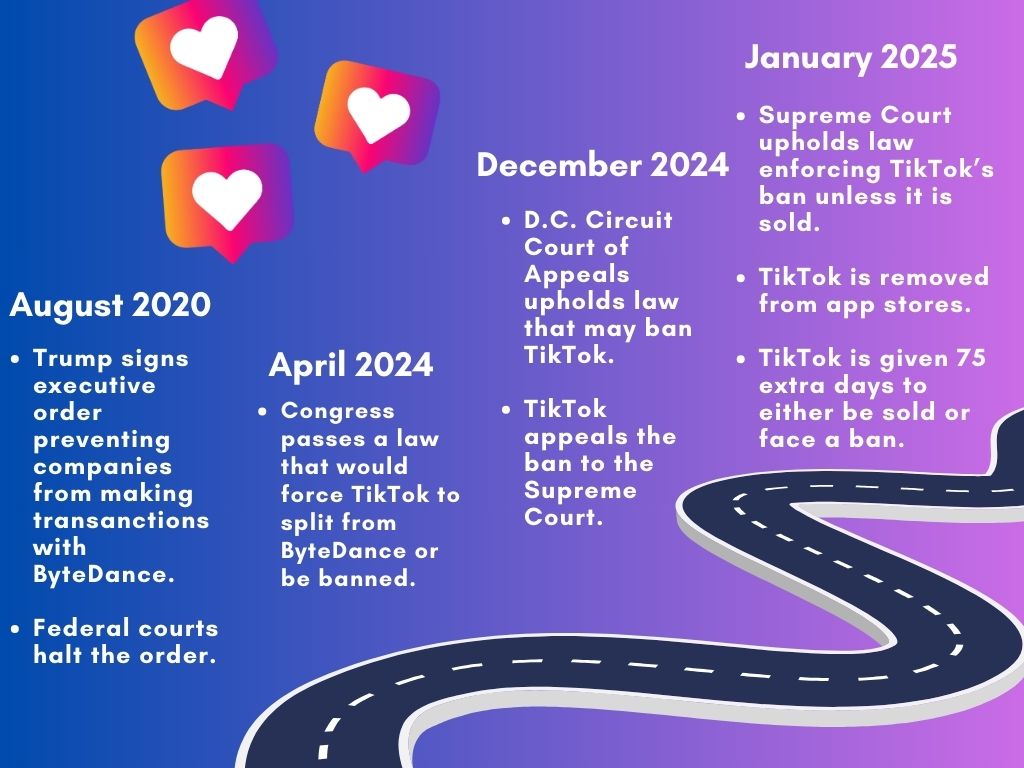TikTok was first considered to be banned in 2020 and in 2024 this discussion was again reignited. Fears of the app shutting down caused many users to turn to similar apps, particularly the Chinese social media app, RedNote. According to Forbes, RedNote acquired over 3 million users from TikTok in a single day following the threat of the ban.
Calls for a ban arose in 2020, when President Trump attempted to enforce a TikTok ban due to security threats regarding data collection by the Chinese government.
“President Trump determined that TikTok raised particular concerns, noting that the platform ‘automatically captures vast swaths of information from its users’ and is susceptible to being used to further the interests of the Chinese Government,” the Tiktok Inc. v. Garland court case said.
Trump’s efforts never materialized until recently. On Dec. 6, 2024, The U.S. Court of Appeals unanimously confirmed a law that could result in TikTok’s ban on the same day.
“[The U.S. Supreme Court] was talking about a ban because [TikTok] is a Chinese company and the [U.S. government is] worried about data and privacy,” said Bridget Donoghue, school-based technology specialist.
TikTok stated that the ban would hinder American users’ freedom of speech; however, the justices rejected the platform’s argument.
President Trump requested 21 days for the Supreme Court to delay the enforcement of a ban until his administration could find a “political resolution.” On Jan. 17, the Supreme Court unanimously affirmed the federal law requiring TikTok to be sold by its Chinese parent company, ByteDance, or face a ban that would take effect on Jan. 19.
“ByteDance Ltd. is subject to Chinese laws that require it to ‘assist or cooperate’ with the Chinese Government’s ‘intelligence work’ and to ensure that the Chinese Government has ‘the power to access and control private data’ the company holds,’” said Tiktok Inc. v. Garland.
On the evening of Jan. 18, 170 million U.S. TikTok users found themselves unable to access the platform. The app was removed from Apple and Google app stores, making it impossible to download.
“I was in the middle of scrolling through TikTok, when it was suddenly banned,” junior Serafina Orvis said. “TikTok has become such an essential part of our society that when it was banned, I could definitely feel a change.”
On the afternoon of Jan. 19, the app became available again to those who had the app previously downloaded after President Trump signed an executive order, temporarily giving TikTok 75 more days.
“I completely did not expect TikTok to be back,” Orvis said. “Unfortunately, I had already deleted the app the night before, so I couldn’t [re-download] it.”
While the TikTok ban proceeds to unfold, the U.S. is adopting new social media platforms. With the vast uncertainty surrounding TikTok, many have sought refuge in a different Chinese social media platform, RedNote, as it is similar to TikTok and provides users with short videos to scroll through. Through RedNote, the hashtag, “#tiktokrefugee” has gained significant popularity, acquiring nearly 250 million views.
“I downloaded RedNote for fun to see what was attracting so many new users,” sophomore Adrian Wicklund said. “Later, I ended up posting.”
Wicklund and his friends created a video about American school lunches on RedNote that gained 2.2 million views, over 20,000 comments and 32,000 followers. With the new influx of Americans on RedNote, there exists a new and unlikely method of communication and cultural exchange between U.S. and Chinese citizens.
“[RedNote] positively sparked discussion between two different cultures comparing their diets and schools,” Wicklund said. “In the 20K+ comments, people even sent pictures of their lunches or schools.”
Despite the transition from TikTok to RedNote, various privacy concerns regarding this new platform still prevail.
“There definitely could be risks as [RedNote] is fully under Chinese laws that can request data at any time,” Wicklund said.
As the reinstated Trump administration manages the court case, the state of the ban continues to evolve, leaving young users and business owners awaiting the final verdict.
“I am definitely more productive without [TikTok],” Orvis said. “Although at the same time, I miss the fun and supportive communities that were present throughout the app.”
Categories:
TikTok faces its final countdown
Supreme Court restricts app to preserve national security
Calls for a TikTok ban began in July 2020 and has since progressed into a potential shutdown in 2025 with the implementation of a new administration.
Donate to The Highlander
$335
$1000
Contributed
Our Goal
Your donation supports the McLean High School's independent, award-winning news publication.
More to Discover














